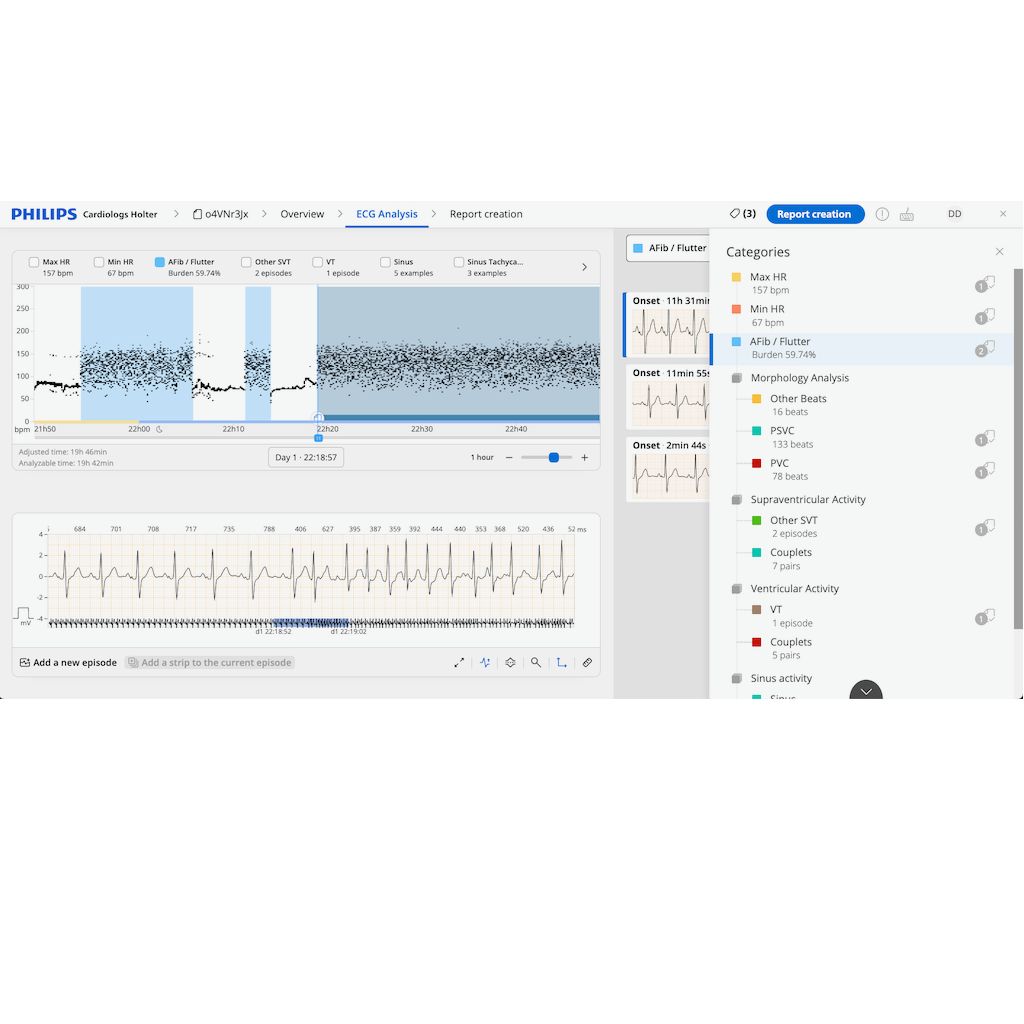
Ambulatory monitoring and diagnostics
Cardiologs AI
The future of cardiac diagnostics lies within AI-assisted analysis
Philips Cardiologs AI engine uses deep neural network (DNN) technology to help healthcare and service providers diagnose patients more efficiently, alleviating the burden of redundant ECG analysis tasks. We are also paving the way for the future of cardiac monitoring by exploring the use of DNN technology to develop ECG biomarkers and analyze cardiac data from smartwatches1.
42%
Reduction in Holter analysis time2,3
Based on a clinical study that compared Cardiologs AI solution with a traditional solution [3].
Read more
Philips Cardiologs AI
Based on deep learning technology and built upon 200M+ recordings4, Philips Cardiologs AI analyzes ECG waveforms as a whole, mimicking the way the human brain works. This enables our algorithms to handle complex ECG patterns better than traditional algorithms that rely on a limited number of predefined rules. Want to learn more?

Our Holter algorithm detects more than 20 types of events
Including the main arrhythmias:
- Pause
- Atrioventricular Block (second-degree, third-degree, advanced high-grade AV block)
- Atrial Fibrillation or Atrial Flutter
- Ventricular Tachycardia
- Premature Supraventricular Complexes (PSVCs), PSVC Couplets
- Premature Ventricular Complexes (PVCs)
- Ventricular Couplets, Ventricular Bigeminy, Ventricular Trigeminy
- Sinus Rhythm, Bradycardia, Tachycardia

10 times reduction in AF false positives in Holter
Validation of our AI algorithm. Using the MIT-BIH public database, our Cardiologs AI algorithm was compared to the results of a reference RR interval-based method5. Our AI algorithm has been shown to improve the specificity of atrial fibrillation detection while maintaining comparable sensitivity, reducing the false positives rate from 17.2% to 1.5%.

Cardiologs Holter
The Cardiologs Holter platform uses deep neural network and cloud technology to help you analyze continuous ambulatory ECGs more efficiently.

Footnotes
- The Cardiologs algorithms for analyzing smartwatch data and ECG biomarkers are being investigated. They are not available for sale.
- The Cardiologs Holter Platform is a medical device intended for use by qualified healthcare professionals for the assessment of arrhythmias using ECG data. It is CE marked and cleared by the FDA under 510(k).
- Fiorina, L., Marijon, E., Maupain, C., et al. AI-based strategy enables faster Holter ECG analysis with equivalent clinical accuracy compared to a classical strategy. EP Europace. 2020;22(suppl 1), euaa162.374. DOI: 10.1093/europace/euaa162.374.
- Philips Cardiologs database - October 2023.
- Li, J., Rapin, J., Rosier, A., Smith, S.W., Fleureau, Y., Taboulet, P. Deep neural networks improve atrial fibrillation detection in Holter: first results. European Journal of Preventive Cardiology. 2016;23(2suppl):41–55. DOI: 10.1177/2047487316668070.
- Fiorina, L., Maupain, C., Gardella, C., et al. Evaluation of an Ambulatory ECG Analysis Platform Using Deep Neural Networks in Routine Clinical Practice. Journal of the American Heart Association. 2022;11(18):e026196. DOI: 10.1161/JAHA.122.026196.
- Fiorina, L., Chemaly, P., Cellier, J., et al. Artificial intelligence–based electrocardiogram analysis improves atrial arrhythmia detection from a smartwatch electrocardiogram. European Heart Journal - Digital Health. 2024;00:1-7. DOI: 10.1093/ehjdh/ztae047.
- Singh, J.P., Fontanarava, J., de Massé, G., et al. Short-term prediction of atrial fibrillation from ambulatory monitoring ECG using a deep neural network. European Heart Journal - Digital Health. 2022;3(2):208–217. DOI: 10.1093/ehjdh/ztac014ztac014.
Disclaimer
Results are specific to the institution where they were obtained and may not reflect the results achievable at other institutions. Results in other cases may vary.